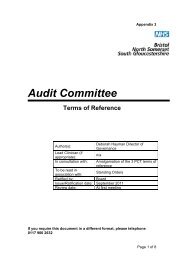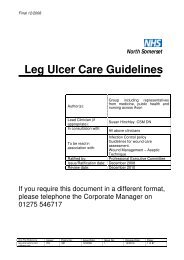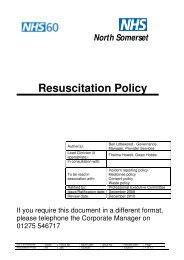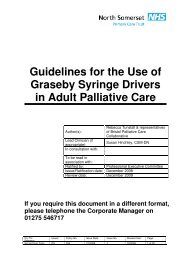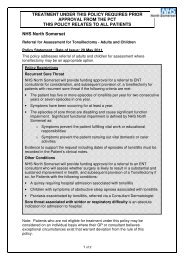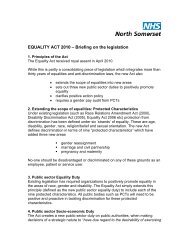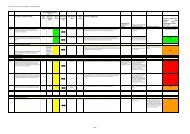Adult Bowel Care Policy.pdf - NHS North Somerset
Adult Bowel Care Policy.pdf - NHS North Somerset
Adult Bowel Care Policy.pdf - NHS North Somerset
You also want an ePaper? Increase the reach of your titles
YUMPU automatically turns print PDFs into web optimized ePapers that Google loves.
11.5 Insertion of Enema<br />
Before considering the use of an enema for treatment of constipation please refer to the<br />
continence formulary for guidance on treating with high dose Movicol (Macrogol 3350)<br />
An enema is a liquid preparation that is introduced into the body via the rectum for the<br />
purposes of producing a bowel movement or administering medication.<br />
An enema may be required for the following:<br />
• Acute disimpaction of the bowel;<br />
• <strong>Bowel</strong> clearance before bowel investigations or surgery;<br />
• To soothe and treat bowel mucosa in chronic inflammatory bowel disease such as<br />
ulcerative colitis and Crohn’s disease.<br />
There are two main types of enemas – evacuant and retention.<br />
11.51 Evacuant<br />
An evacuant enema is designed to prompt the bowel to expel faecal matter or flatus,<br />
together with the contents of the enema.<br />
Phosphate and sodium citrate (Microlette) are the most common types. Possible risks<br />
associated with phosphate enemas have been raised (Davies, 2004)<br />
so an assessment of need is vital. A recent systematic review of the adverse effects of<br />
phosphate enemas (Mendoza, 2007) found an absence of conclusive evidence. Those<br />
aged under five and over 65 appear to be most at risk, especially older people with<br />
chronic renal failure and/or diseases that alter intestinal mobility.<br />
11.52 Retention<br />
A retention enema is designed to be retained in the rectum. The most common are:<br />
• Steroid and aminosalicylate preparations;<br />
• Arachis oil enemas, which soften and lubricate impacted faeces. They contain<br />
groundnut and peanut oil, which means they should be avoided in patients with a nut<br />
allergy.<br />
Nurses must have a sound knowledge of the use, action, dose and possible ill<br />
effects of administrating an enema. Volume retention enemas are contraindicated in all<br />
spinal injury patients.<br />
Kyle G (2007)<br />
For full procedure see appendix 5<br />
Doc File Reference Issuer: <strong>Policy</strong> No: Issue Date: Issue No: Review Date: Page:<br />
<strong>Adult</strong> <strong>Bowel</strong> <strong>Care</strong> <strong>Policy</strong> PS 337 06/2009 1 06/2010 15 of 42<br />
15



